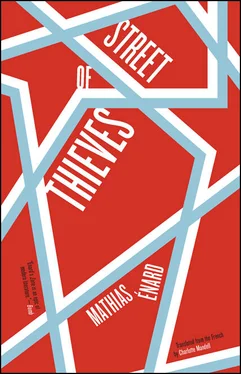The city was wavering between insurrection and festivity — the Gran Via was still full of people, I passed an old lady carrying a sign saying “He who sows poverty reaps rage,” a little girl holding the string of a balloon that read “Enough budget cuts,” students chanting Rajoy, chulo, te damos por culo, Rajoy, you pimp, we’ll give it to you from behind, and other pleasantries along those lines, in the stench of burning trash and tear gas — strangely, a little bar tucked behind some scaffolding was open, I decided to take a rest and wait for things to calm down a little. I ordered a coffee which I eked out — the TV was showing the day’s events live, I saw the battle scene I had just been part of on Plaça Urquinaona, taken from a different angle: it was a very strange sensation to think that behind those policemen, on the left, at the corner of Carrer Pau Claris, they could have seen me. The TV was the periscope of a lost submarine.
Night fell. I was afraid of being arrested along with a group of activists by accident, so I decided to make a big detour to get to my neighborhood, my fortress, the Palace of Thieves: to go by Carrer Diputació to Villaroel, go down to the Sant Antoni Market and enter the Raval by Carrer Riera Alta. A detour that took a good forty-five minutes, but that should prevent me from finding myself by chance in the midst of a club-wielding horde of police. On Diputació, at every street corner, you could see, five hundred meters lower down on the left, around Plaça de Catalunya, the white emanations of gas mingling with the black smoke of trashcans on fire. I managed to meet up with Judit — she had left the demonstration to go back up to her place when the cops charged at the corner of Diagonal and Passeig de Gràcia; her voice was hoarse; I asked her if she was all right, yes yes, she answered, of course; I didn’t press further.
The detour was a good idea — aside from local policemen on motorbikes who prevented the cars from reaching the center, I passed only groups of store owners talking in front of their half-closed shops, or young people with grave, frightened faces climbing up from University Square.
The two temporary buildings of the Sant Antoni Market were a gateway in imaginary ramparts; behind them opened the Raval and, in its heart, the Street of Thieves — I was safe. God knows why, the neighborhood was blacked out. No street lights. Maybe an effect of the strike, or a coincidence; a few shops were open and threw a strange wavering glow onto the asphalt, adding an even more medieval look to our castle of the poor. On Carrer Robadors, nothing had changed: our blacks were keeping a lookout at the corner, waiting for God knows what that never arrived; Maria was in front of her door, skirt hiked up to mid-thigh; fat cockroaches scurried out of my way as I climbed the stairs; Mounir was in front of the TV, feet up on the coffee table, in socks. I collapsed next to him on the sofa, worn out — I had walked for almost four hours.
The TV showed the images of the day on loop.
I began to play mechanically with the knife that Mounir had placed on the table as usual; it was a short but wide weapon, very sharp; a spur of metal kept the blade from folding back in once opened, a very powerful spring you had to release to close it back up. The handle was short, steel, covered with two pieces of red wood. Solid, sharp, dangerous. I asked Mounir if he’d used it yet, he said no, in your dreams, I haven’t even taken it out of my pocket in front of anyone. It’s just a security measure, you never know.
You do, in fact, never know.
On TV, the commentaries remained the same.
The unions were delighted with the strike’s great success.
The government was delighted to be able, starting tomorrow, to resume its indispensable economic reforms.
In the distance, the helicopter still circled.
THEnext day the city awoke feverish and in disbelief; the wave of violence was still trembling in the morning — curious onlookers stared at the broken windows in little groups, making comments in low voices; cleaning teams tried to erase all traces of fire as quickly as possible. In the papers, the only thing they talked about was the cost of the damage, the number of arrests.
The difference from Tunis, Mounir said to me, possibly the only difference, is that in Tunis the chaos continued the next day, the day after that, and the day after that. Here, it’s as if nothing had happened. They repair the bank façades, the government continues its work, the revolutionaries return to their skateboards, and the tourists resume control of Plaça de Catalunya.
Here, everyone still has too much to lose to launch an insurrection, believe me.
Of course, at the time, we couldn’t know.
Mounir was desperately trying to earn some money, more money — he took insane risks to steal cameras that were increasingly expensive, wallets that were never fat enough, I suggested a kind of association with him, so he wouldn’t have to steal so much, I had an idea, which came from Casanova’s memoirs — the Venetian was like Mounir, he too was always in need of money and, in Paris, he invented something extraordinary for the King of France: the lottery, that is, a money game where everyone emerged a winner, or almost. I explained to Mounir how you could earn dough by organizing the Lottery of Thieves, a nice, neat, underground operation — we were on that sidewalk café on Carrer del Cid that we liked for its quietness, five hundred meters from the Carrer Robadors, and I was making him laugh with my lottery stories, he found it hard to believe that it could work. If we don’t try, we’ll never know, I said. Of course money games are a sin, but for the player, not for the organizer, I suppose.
You think there’s a lottery in Saudi Arabia?
I found it extraordinarily funny that it was old Casanova who provided us with this magnificent idea. Of course a little investment was necessary, at least for the winnings from the first drawing, if we didn’t sell enough tickets the first time around. We’d be much less greedy than the State and we’d reinvest most of our earnings, keeping just a profit of twenty percent of the stakes — the rest would go to the owner of the winning ticket.
Mounir strongly doubted that clients would trust us, but the projections made him salivate: look, if we sell, let’s say, 50 tickets at 10 euros each, that makes 500 euros. We give 400 euros in winnings, and we keep 100 euros. If 10 euros seems too much to you, we can do the same with 5 euros.
Mounir began to understand all the magic of this beautiful invention. He made calculations. Hey, he was a clever one, your Casanova. Did he really invent that? Yes, I think so, I replied. At least that’s what he says.
Putting this plan into action was obviously more complicated than we’d thought, but one week later we had printed our tickets for our underground lottery — I was the investor, so I had taken charge of this material part of the business. In the end, we found it simpler to use the results of an existing lottery instead of organizing our own, and this way had the additional advantage of giving us a certain legitimacy: everyone could check, via the paper or the special kiosks, if he had won or lost.
This activity was very Spanish, people told me: at Christmas, everyone (associations, businesses, supermarkets, administrations) organizes lots of lotteries. So ours would have the particularity of being out of season and Casanovan.
Of course, this initiative was an almost complete fiasco: we sold three tickets, two in the Moroccan restaurant on the Street of Thieves and a third to Judit’s mother, which was a little shameful — on his side Mounir couldn’t manage to palm off a single one on his own, making the rounds of all the Chinese outfits on the Raval, and this when the (supposed) Chinese passion for gambling was going to make our fortune.
Читать дальше












